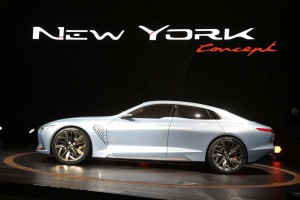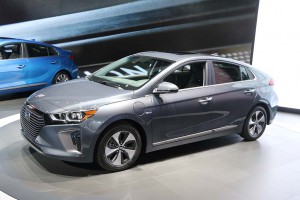
The Genesis Sport Sedan concept uses a hybrid drivetrain, but we can expect the production Genesis G70 to add a conventional gas engine and a performance, version.
Hyundai’s new Genesis luxury brand is set to add a plug-in hybrid to its line-up, and could eventually add more than one of the green models, according to its top U.S. executive.
The move is in line with what key competitors, including Mercedes-Benz, BMW and Lexus are planning. Luxury brands are making an especially aggressive push into plug-based powertrain technology, in part, to help offset the lower mileage and higher emissions of their conventional, gas-powered products.
“We believe alternative-propulsion engines are going to be really important,” Dave Zuchowski, the CEO of Hyundai Motor America, and head of Genesis operations in the U.S., told Automotive News.
The mainstream side of the Korean maker’s line-up is already rolling out several plug-in models, including a version of the Hyundai Sonata sedan, as well as the new Ioniq. The latter model will eventually be offered with three different battery-based powertrain options: a base hybrid, a plug-in, and a pure battery-electric version.
(Hyundai blitzing market with 26 green machines. For more, Click Here.)
Plug-based models have several potential advantages that appeal to luxury and mainstream makers alike. A number of cities in Europe and Asia are enacting limits on conventional gas vehicles. Some are considering restrictions that would allow only zero-emissions vehicles to operate in city centers. In China, meanwhile, qualified, battery-based vehicles sidestep monthly restrictions on new vehicle sales in major cities such as Shanghai and Beijing.
But, according to Zuchowski, plug-ins will be “even more important in the luxury market than they are in the mainstream market.”
There are several reasons why. For one thing, luxury brands tend to rely on larger gas engines that deliver lower fuel economy and higher emissions than mainstream products. Meanwhile, manufacturers are betting that luxury buyers are more willing and able to swallow the added cost of battery-based vehicles.
Whatever the reason, luxury makers are getting ready to flood the market with plug-in hybrid electric vehicles. Mercedes-Benz, for one, expects to have 10 different PHEVs on the market by the end of next year. BMW and Audi won’t be far behind. Lexus, which introduced the world’s first luxury hybrid, is expected to enter the fray, as is Cadillac, the latter confirming a plug version of the new CT6 sedan.
(Click Here for details about the third sedan in the Genesis line-up.)
Even more exotic luxury brands are getting into the act. Bentley, for example, intends to bring out a PHEV version of its new Bentayga sport-utility vehicle by late 2017 or early 2018.
Genesis officials are not offering details on their own plug-in plans, nor even saying whether they will offer the technology on one or multiple models. But considering the system is expected to be, essentially, plug-and-play, that likely would allow it to be used on more than one vehicle.
Genesis made its formal debut earlier this year, showing off a Hybrid Sports Sedan concept at the New York Auto Show in March. It will initially focus on two models, the G80 and G90 – which replace the old Hyundai Genesis and Equus sedans, respectively.
But the Sports Sedan will soon morph into a production version taking aim at the likes of the BMW 3-Series, Zuchowski told TheDetroitBureau.com. Known internally as the IK, it will be badged the Genesis G70. It remains to be seen if the G70 will pick up the concept model’s conventional hybrid which pairs a 242-horsepower I-4 with an electric motor.
(To find out more about the Ioniq from Hyundai, Click Here.)
Genesis will eventually add three other models, several executives confirmed, including two SUVs and a coupe.

